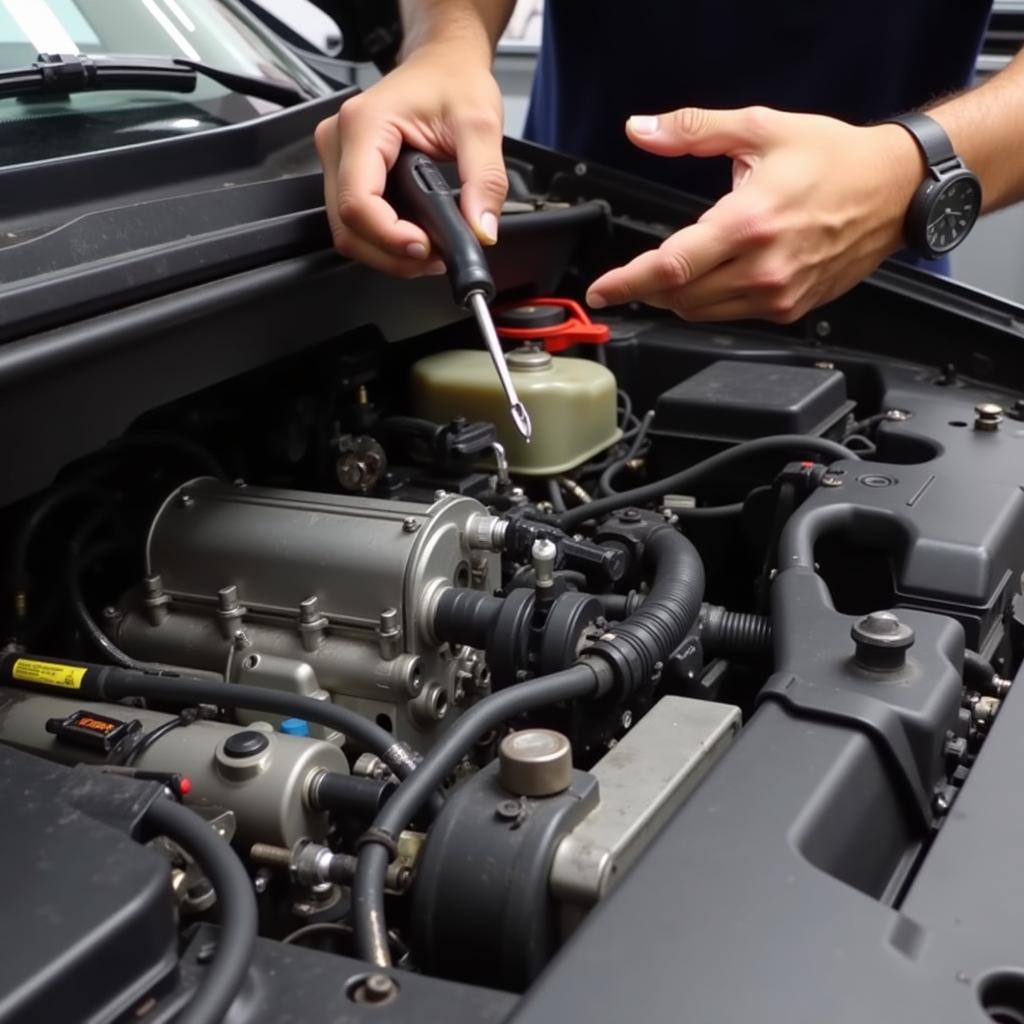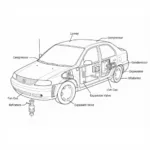Car air conditioning DIY repair can seem daunting, but with the right knowledge and tools, many common AC issues can be tackled at home. This guide will equip you with the necessary information to diagnose and potentially fix your car’s AC system, saving you time and money.
Understanding Your Car’s AC System
Before diving into car air conditioning DIY repair, it’s crucial to understand the basic components and how they interact. The AC system is a closed loop, circulating refrigerant that absorbs heat from the cabin and releases it outside. Key components include the compressor, condenser, evaporator, expansion valve, and receiver-drier. Each part plays a vital role, and a malfunction in one can affect the entire system. Knowing how these parts work together is the first step in successful DIY repairs. Are you ready to delve deeper into car air conditioning DIY repair? Let’s explore the common problems you might encounter. Check out our guide on air conditioning repair kit for cars.
Common Car AC Problems and DIY Solutions
Several issues can plague a car’s AC system, ranging from simple fixes to more complex repairs. One common problem is a low refrigerant level, which can lead to poor cooling. Another culprit could be a faulty compressor clutch, preventing the compressor from engaging. Leaks in the system can also cause refrigerant loss and inefficient cooling. Furthermore, a clogged expansion valve or a malfunctioning blower motor can disrupt airflow and temperature regulation.
Diagnosing AC Issues: Where to Begin?
Identifying the root cause of an AC problem is the most critical step in car air conditioning DIY repair. Start by checking the refrigerant level using a pressure gauge. Low pressure indicates a leak or insufficient refrigerant. Inspect the compressor clutch for proper engagement. If the clutch doesn’t engage, the compressor won’t circulate the refrigerant. Next, check for leaks by visually inspecting the hoses and connections for signs of damage or oil residue.
 Mechanic Checking Car AC Compressor Clutch Engagement
Mechanic Checking Car AC Compressor Clutch Engagement
DIY Repairs: What Can You Tackle at Home?
While some AC repairs require professional expertise, several tasks can be performed at home with basic tools and knowledge. Recharging the refrigerant is a relatively straightforward process, provided you have the correct refrigerant and equipment. Minor leaks can sometimes be repaired using a car air conditioning pipe repair kit. Replacing a cabin air filter is another simple DIY task that can improve airflow and AC performance. However, more complex repairs, like replacing a compressor or condenser, are best left to professionals. If you’re looking for comprehensive resources on DIY AC repair, consider visiting our page on do it yourself car air conditioning repair.
When to Seek Professional Help
While car air conditioning DIY repair can save money, knowing your limits is essential. If you’re unsure about a diagnosis or uncomfortable performing a repair, it’s always best to consult a qualified technician. Complex repairs, such as replacing major components or dealing with electrical issues, require specialized tools and expertise. Attempting these repairs without proper training can lead to further damage and higher costs in the long run.
Conclusion
Car air conditioning DIY repair can be a rewarding experience, empowering you to maintain your vehicle’s comfort and functionality. By understanding the basics of your AC system, diagnosing common problems, and knowing your limitations, you can successfully tackle many AC issues. However, remember that some repairs require professional expertise. For reliable and affordable car AC services in specific locations like Bedford or Hull, you can check out our pages on car air conditioning repair bedford and car air conditioning repair hull. Don’t let a malfunctioning AC system ruin your driving experience – take control with informed car air conditioning DIY repair or seek professional help when needed.
FAQ
-
What is the most common cause of car AC problems? Low refrigerant levels are often the culprit.
-
How can I check my car’s refrigerant level? Use a pressure gauge designed for AC systems.
-
Can I recharge my car’s AC myself? Yes, with the proper refrigerant and equipment.
-
How often should I replace my cabin air filter? Typically every 12-18 months, or as needed.
-
What are the signs of a faulty AC compressor? Unusual noises, poor cooling, and clutch failure.
-
How much does a professional AC repair cost? It varies depending on the issue and location.
-
Is it safe to drive with a leaking AC system? Yes, but it will be less efficient and may cause further damage.
For assistance contact us via WhatsApp: +1(641)206-8880 or Email: [email protected]. Our customer support team is available 24/7.


